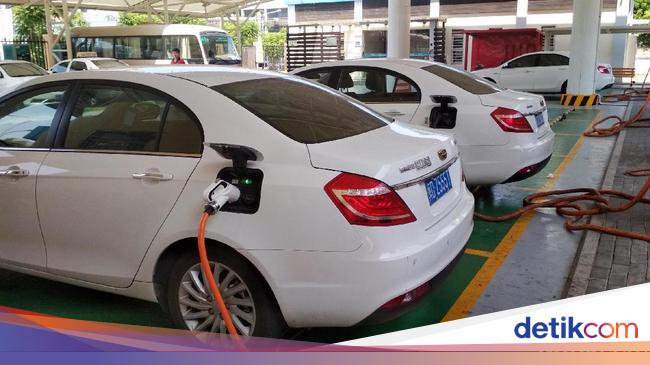Jakarta –
Indonesia is aggressively encouraging the use of battery electric vehicles (BEV). But on the other hand, Small and Medium Industries (IKM) also need to prepare themselves to welcome the era of electrification.
Director General of Metal, Machinery, Transportation Equipment, and Electronics (ILMATE) Ministry of Industry of the Republic of Indonesia Taufik Bawazier said internal combustion engine (ICE) cars still contribute to the national economy.
“In Indonesia, ICE is 99 percent of driving the national economy, so the contribution of the economic sector in Indonesia is still ICE, therefore the government will try to transition because it includes forward linkage and backward linkage into IKM (Small and Medium Industries) which produce spare parts. There are many IKM automotive parts there, other related industries are extraordinary where the GDP is 20 percent of the industry there, meaning that automotive is indeed the most strategic sector,” said Taufik during a seminar at the 2022 Perikliindo Electric Show, JIExpo Kemayoran, Central Jakarta, Monday (25/25). 7/2022).
ADVERTISEMENT
SCROLL TO RESUME CONTENT
–
He continued electric cars in the world population is growing faster. Especially China, which has the largest number of electric cars in the world.
“Now the issue, as stated by Mr. Moeldoko, is how the variable electric economy is cheaper than gasoline,” said Taufik.
“So in 2012 there were about 120 thousand electric cars circulating in the world. Then in 2021 yesterday, 6.6 million electric cars circulated in the world, 3.3 million of them were in China, meaning that 50 percent of the electric cars were circulating in China,” he explained. he.
“Why are these countries developing faster?” added Taufik.
One of the factors is price. The price tag of an electric car is certainly a consideration in accelerating acceleration in Indonesia. In the bamboo curtain country, the government even provides subsidies in the form of price discounts so that electric cars are equivalent to ICE cars.
The development of BEVs requires additional tax incentives to make them more affordable. Currently, Indonesia has only received a 0% luxury goods sales tax incentive (PPnBM) for BEVs and has already received a 0% transfer fee (BBN) incentive for DKI Jakarta, with a 5% import duty (BM) rate. But it is considered not enough to reduce the selling price of electric cars.
As for the imposition of taxes that are still subject to, for example, import duty rates, as well as 0% value added tax (VAT) and income tax (PPh).
Indonesia is currently also encouraging automotive manufacturers to establish electric car factories in the country. Total domestic content (TKDN) is also encouraged so that manufacturers get even cheaper incentives. Not only that, the government has also invited investors to process batteries domestically, as the main component of electric cars.
“Most of the ecosystems, if possible, already exist in Indonesia. This first saves supply chain costs. The ICE to hybrid transition costs 20 percent. From ICE to Electric Batteries it costs 60 percent. This is a discussion,” said Taufik.
“The gap that I see in China between ICE and BEV is now only 10 percent, in other countries it’s still 50 percent, this must also be studied, what are the variables, what are the factors,” said Taufik.
Watch Videos”This is how it costs and how to charge an electric car at Pertamina gas stations“
[Gambas:Video 20detik]
(riar/din)
–


